A year or so back I finally got this gadget developed to version 6. It replaces the 5-pin mike socket in a Cobra 2000, 142, Uniden Madison/Washington radio with a 4-pin socket. It was version 5 of this thing, but it had a fatal flaw. Had to scrap them.
First version from 2003 or so used a relay to keep the two ground circuits on the 5-pin mike jack properly isolated from each other. Hooking those two separate ground circuits together to use a 4-wire mike cord tends to cause feedback squeal problems on both transmit and receive.
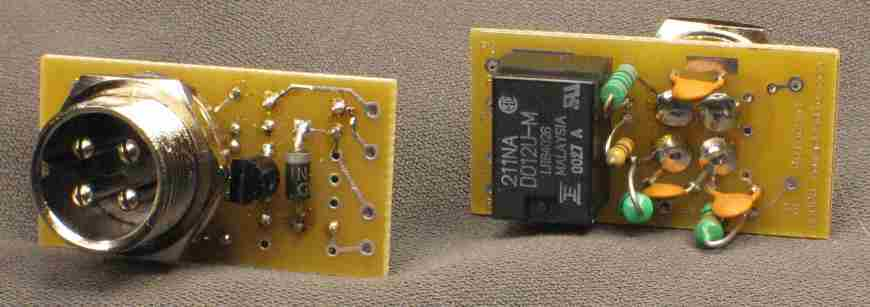
Just one problem. A lot of radios would make a loud "POP!" out the speaker when you unkey the mike. Figured out it was a timing issue. Your thumb on the PTT button delays turning the speaker back on. A single relay was just too fast.
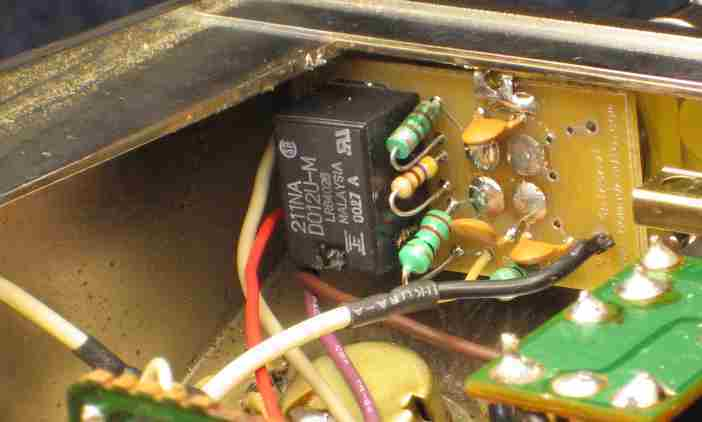
Finally made a prototype of the 2-relay solution and built a production batch of fifty.
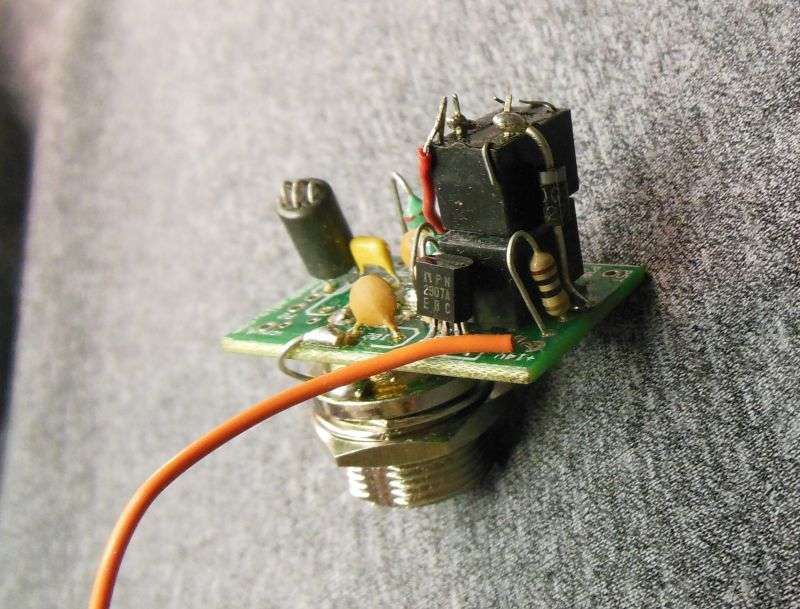
Just one problem. The relay I used sucks.
Oops. I chose it because it's the smallest one I could find. Making two relays fit behind the mike socket calls for a small relay. But it had a fatal flaw, a seam that holds the top of the plastic case. Fujitsu used glue, and the cap would just pop right off.
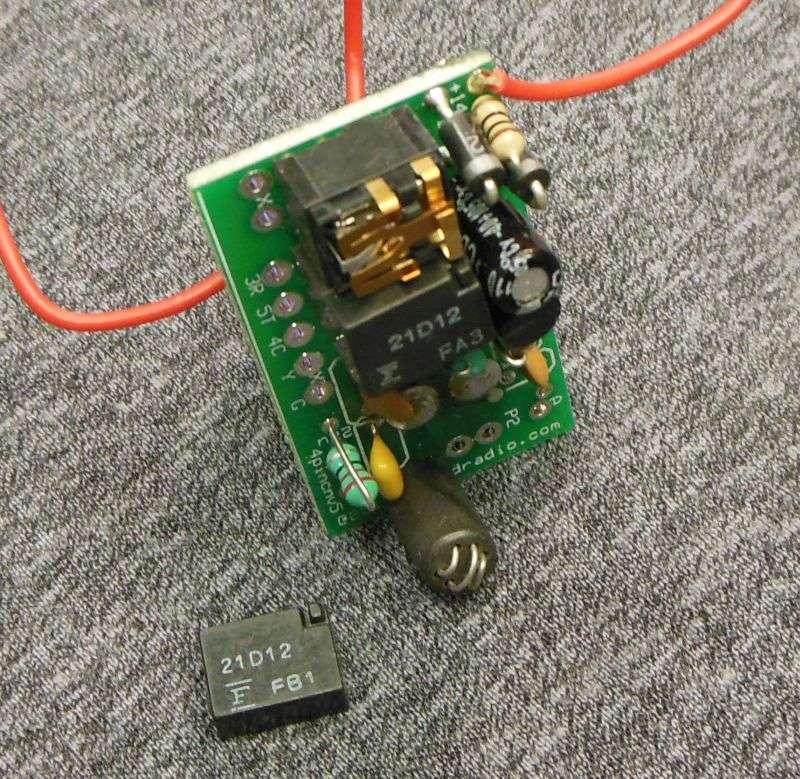
Oops. Built all fifty of them before I figured out I couldn't sell them. It was just too fragile.
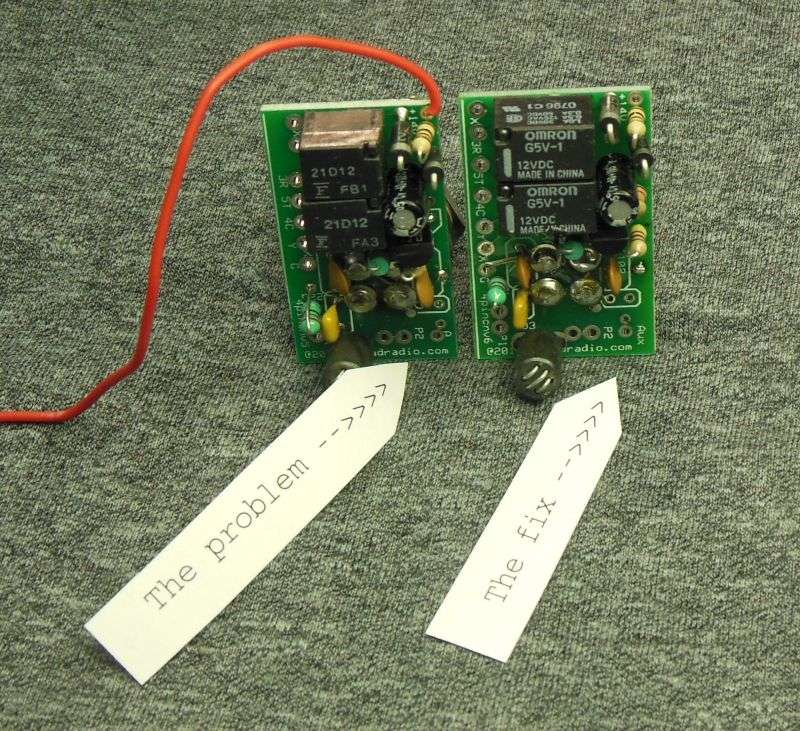
Some days the bear gets you.
Finally made two slightly-larger relays fit on a board that fits in a Cobra 2000, 148, Madison, etc.
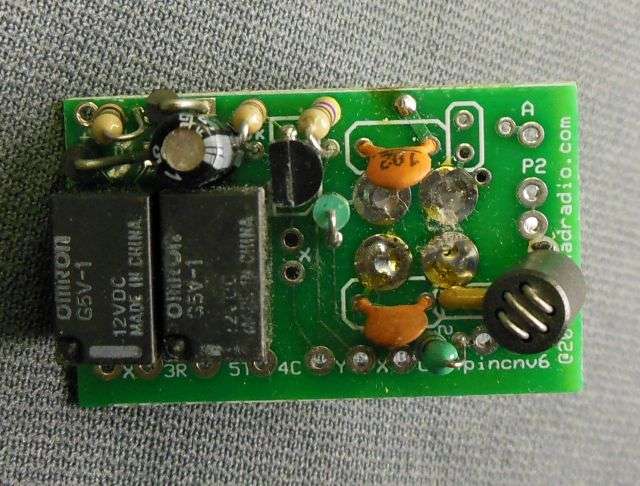
So far no mention of just why. Sure, your old 4-wire D104 will work on this radio now. We're only using three wires out of the 4 pins. No need to plug in a mike to get your receiver audio now.
What really goosed this idea was the demand for roger beep/roger-K/5-tone beeps that have no relay on them. They'll work just fine in RCI-made radios that receive without the mike plugged in. Jut hooks right up.
But the Uniden 40-channel 5-pin SSB radios are different. You need a way to shut off the speaker while the beep is holding the transmitter keyed. The mike can't do this, since you just released the PTT button. Got tired of hand wiring the whole thing, and put it onto a pc board with the 4-pin socket.
But those are the only two problems that this toy will solve. Also lets you put a bump-bump into a Cobra 1000, 29 or President Zachary/Dwight D or other radio with the mike-needed-to-receive issue.
The extra holes in the board allow it to be adapted in one more way. Haven't tried this revision yet, but the 23-channel Johnson radios required a six-wire cord. The transmit/receive wires were not connected to ground, but to the hot side. The mike would switch 12 Volts to the reciever, or to the transmitter when you keyed it. That sixth wire was to shut down the receiver speaker in transmit. That's where the useless yellow wire in your six-wire Astatic and Turner mike cords would connect. By cutting a couple of traces and adding some wires, this version should let you put a 4-pin socket in a Johnson 250 Base, and the others that used the 5-pin metal lock-ring mike plug. But wait a minute, where do you connect six wires to a five-wire plug? Simple. The metal body of that plug was the connection for the sixth wire. Odd but true. Not sure how long until we'll have pics to show this hookup, if ever. Not a lot of demand for that mod.
Gotta get this batch tested. Pricing the thing will be a problem. Probably ought to just pre-wire it to a Bump-Bump and sell the package that way.
But at least this version won't puke after it's been in the radio for a week or three.
73
First version from 2003 or so used a relay to keep the two ground circuits on the 5-pin mike jack properly isolated from each other. Hooking those two separate ground circuits together to use a 4-wire mike cord tends to cause feedback squeal problems on both transmit and receive.

Just one problem. A lot of radios would make a loud "POP!" out the speaker when you unkey the mike. Figured out it was a timing issue. Your thumb on the PTT button delays turning the speaker back on. A single relay was just too fast.

Finally made a prototype of the 2-relay solution and built a production batch of fifty.

Just one problem. The relay I used sucks.
Oops. I chose it because it's the smallest one I could find. Making two relays fit behind the mike socket calls for a small relay. But it had a fatal flaw, a seam that holds the top of the plastic case. Fujitsu used glue, and the cap would just pop right off.

Oops. Built all fifty of them before I figured out I couldn't sell them. It was just too fragile.

Some days the bear gets you.
Finally made two slightly-larger relays fit on a board that fits in a Cobra 2000, 148, Madison, etc.

So far no mention of just why. Sure, your old 4-wire D104 will work on this radio now. We're only using three wires out of the 4 pins. No need to plug in a mike to get your receiver audio now.
What really goosed this idea was the demand for roger beep/roger-K/5-tone beeps that have no relay on them. They'll work just fine in RCI-made radios that receive without the mike plugged in. Jut hooks right up.
But the Uniden 40-channel 5-pin SSB radios are different. You need a way to shut off the speaker while the beep is holding the transmitter keyed. The mike can't do this, since you just released the PTT button. Got tired of hand wiring the whole thing, and put it onto a pc board with the 4-pin socket.
But those are the only two problems that this toy will solve. Also lets you put a bump-bump into a Cobra 1000, 29 or President Zachary/Dwight D or other radio with the mike-needed-to-receive issue.
The extra holes in the board allow it to be adapted in one more way. Haven't tried this revision yet, but the 23-channel Johnson radios required a six-wire cord. The transmit/receive wires were not connected to ground, but to the hot side. The mike would switch 12 Volts to the reciever, or to the transmitter when you keyed it. That sixth wire was to shut down the receiver speaker in transmit. That's where the useless yellow wire in your six-wire Astatic and Turner mike cords would connect. By cutting a couple of traces and adding some wires, this version should let you put a 4-pin socket in a Johnson 250 Base, and the others that used the 5-pin metal lock-ring mike plug. But wait a minute, where do you connect six wires to a five-wire plug? Simple. The metal body of that plug was the connection for the sixth wire. Odd but true. Not sure how long until we'll have pics to show this hookup, if ever. Not a lot of demand for that mod.
Gotta get this batch tested. Pricing the thing will be a problem. Probably ought to just pre-wire it to a Bump-Bump and sell the package that way.
But at least this version won't puke after it's been in the radio for a week or three.
73



